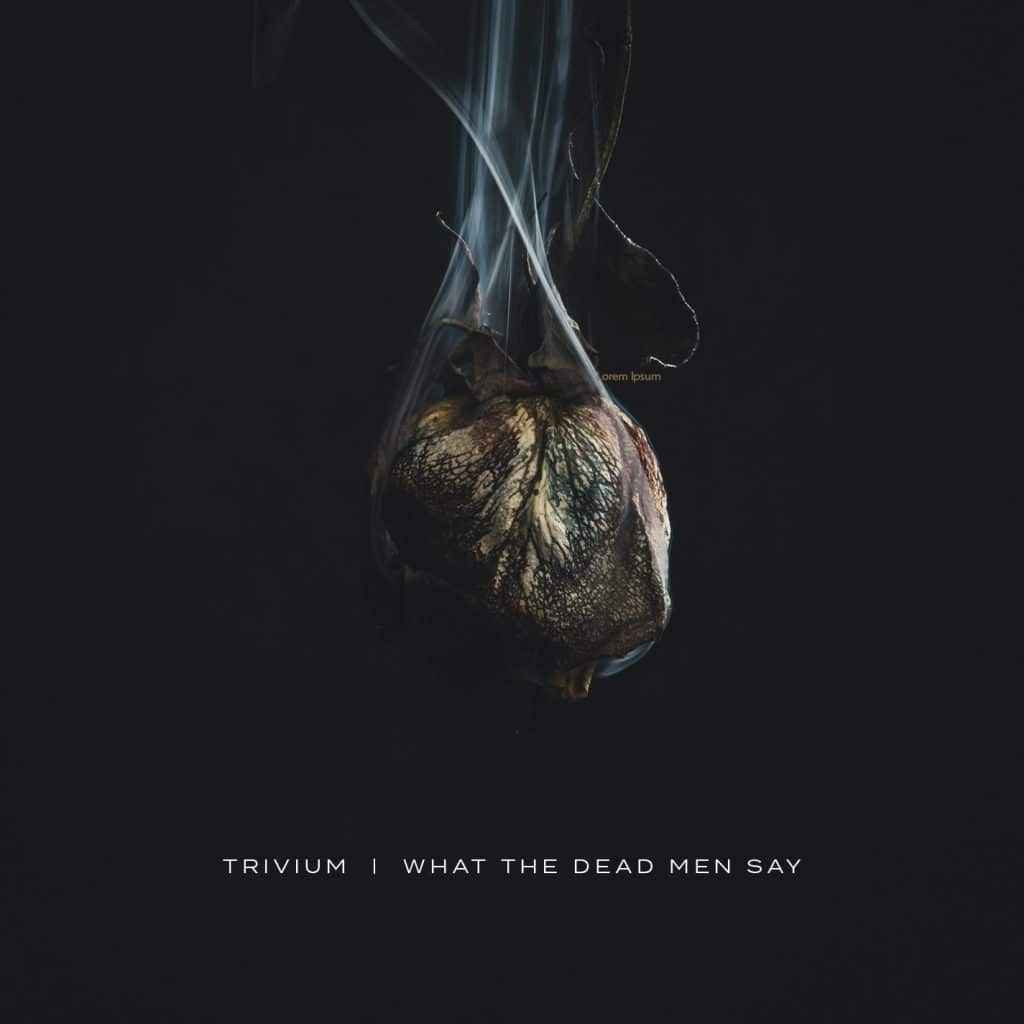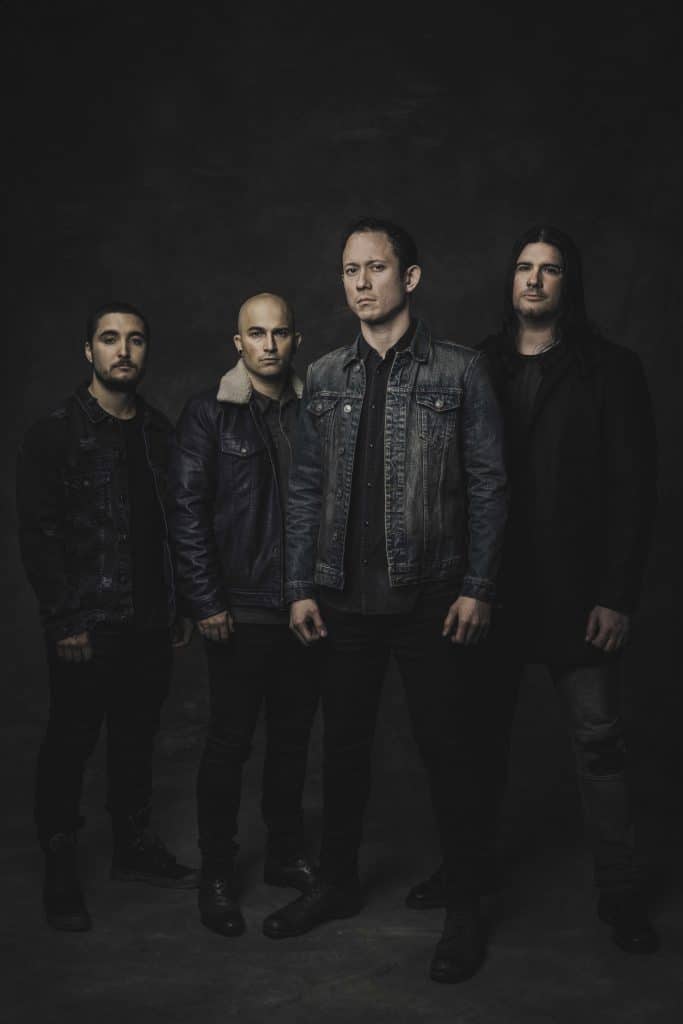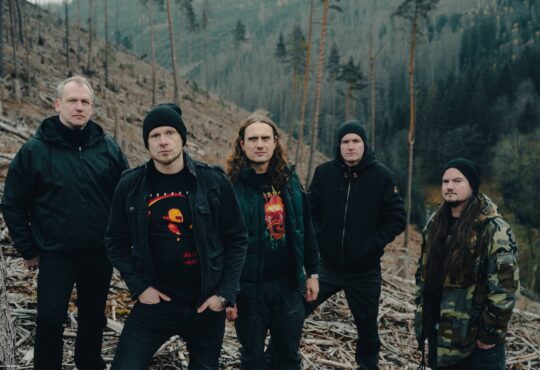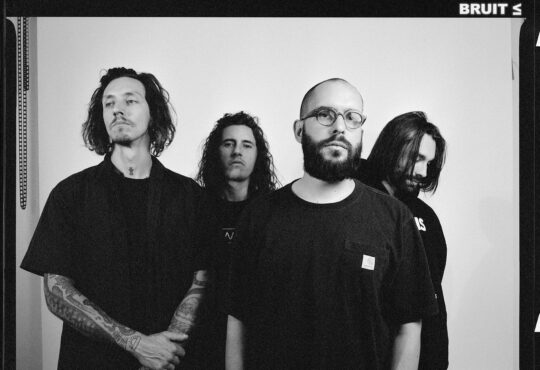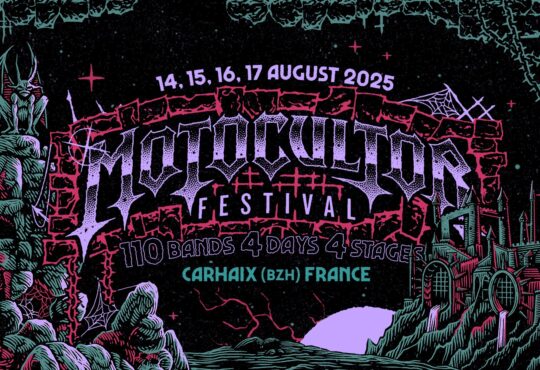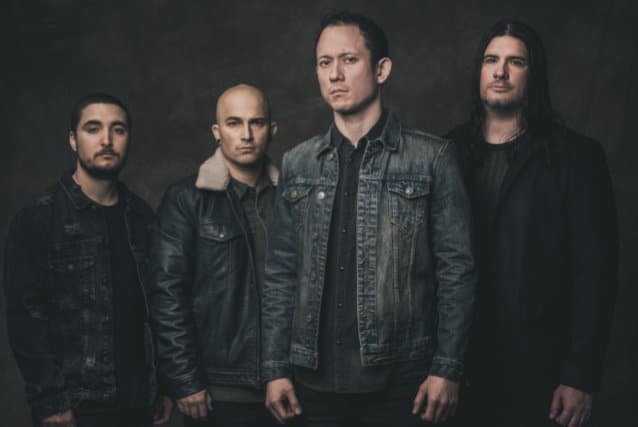
RockUrLife caught up with Matt Heafy before the release of Trivium’s new record “What The Dead Men Say” to discuss the band’s evolution and how they approched this new era!
First and foremost, how are you?
Matt Heafy (vocals/guitar): I’m doing good, I can’t believe we’re not there right now. We were supposed to be in Paris, I was so excited because I love the city, I love France, I was ready to eat and drink. Unfortunately with the Asian tour also being cancelled it was difficult to make it.
So, before we dive into the new record let’s rewind a bit. Last time we spoke was before the release of “The Sin And The Sentence” (2017). What an era it’s been for the band!
Matt: Things have been incredible! It’s amazing to be able to look back and see that we’ve been in this for 21 years now. I still can’t believe it’s been 21 years that I’ve been in this band and things seem to just keep getting better in every sense of the word. I feel like all of this; the musicians, the songwriters, the performance have all gotten so much better at our craft and what we do. I feel like now it’s time where every Trivium fan across the board of every single record come together. Whoever is familiar with Trivium knows that we have fans who love one record and don’t love another. We got a bunch of “Ascendancy” fans, “In Waves” fans, “Shogun” fans. They all say: “oh that’s the best one!” but with “The Sin And The Sentence” I feel like everyone was able to agree “alright, this is now the one we can all love together” and it was great to finally see that. Having so many different factions was always a little confusing but now that everyone agrees that one is the best, we’re very happy to see that.
It had both critical and fans acclaim which is honestly something quite difficult to achieve.
Matt: I agree. With Trivium, we have never been the band that all agreed upon the press, that’s on every magazine. We’ve never been a band that is a press favorite or a band’s favorite except for “Ascendancy” which was the only time in our career. The UK press especially really put us up on a high pedestal thing that we’re going to be the next biggest thing in the world but then as soon as we released “The Crusade” the UK did not like that record so they said we went from the best band in the world to the worst band in the world. It was the only time in our career that we ever had overwhelming press backing our band so for the rest of the time we’ve always had to kinda go all alone and we’ve always had to just make music for ourselves and our fans. With both “What The Dead Men Say” and “The Sin And The Sentence” , we follow the same formula we did for my favorite Trivium records which, if I look back, would be: “What The Dead Men Say”, “The Sin And The Sentence”, “Shogun”, “In Waves”, “Ascendancy”, “Ember To Inferno”. So now, what’s different for these albums in comparison from the ones I didn’t mention is that we didn’t limit ourselves. We didn’t say: “alright we’re sticking to this one thing” what we did is that we just made the kinda music we want to hear. We said: “there are no limitations, there are no rules, whatever we want to make happen, we can make happen”. Those are also records that we didn’t allow anyone to really comment and help us on. We didn’t talk to our producers until we knew the music between the four of us, until we had actually been in our jam room together and really play the music out. With “The Crusade”, it was my personal decision to make an album that was a rebellion against the last one. I said: “let’s do everything the exact opposite of the last record, let’s not have any screaming, no breakdowns, let’s make this more of a traditional trash and modern metal record” and we just did. For “Vengeance Falls” and “Silence In The Snow” we really listened to the producers, we did not fully finish the songs as a band until we went to the studio. Which is kinda the standard, a lot of bands don’t really finish the music until they go to the studio but for us, we need to have that stuff to muscle memory. With “What The Dead Man Say”, we knew the material so well that it took us 16 days to record it which is insane! We were so prepared, I had been practicing the vocals, and vocal melodies in the songs maybe 6 to 9 months and no one knew we had anything new! We just kept it a secret. We like to do that, we like to make everything perfect until we present it. It gives people the opportunity to be excited about something.
It’s even more meaningful, especially since you say you don’t really care of the expectations, that you earned a grammy nomination by making the music that you love.
Matt: I totally agree, it’s gotta be about that. I had a phone call with Ihsahn from the band Emperor and we were having this discussion about the reason why I love what he does which is that you never know what you’re gonna get. There are bands out there that do great at one thing, and that’s what that band wants to do like the AC/DC format. You know exactly what you’re getting when it comes to AC/DC. They will give you a fantastic record that sounds like AC/DC. When you think about Trivium, or Ihsahn in Emperor, you never know what you’re gonna get and I think that’s also very cool. I think that’s a part of our sound and a part of his too. We discussed that it’s just about making the kind of music that you truly believe in and that you wanna hear first and not trying to please anyone else. That’s the best way!
Let’s dig into the new album. Firstly with “Catastrophist” could you tell us about the story and making of the the song?
Matt: What’s really great cool this song is that we were originally thinking that “Catastrophist” would be the name of the new record same as we thought “The Revanchist”, from the french word “revanche”, would be the name of the last album. We were on this idea of “Catastrophist” being the theme of the album since it felt topical and worldly. It was on a walk back from a local coffee shop with my twins and my wife, who has done the art direction for the band on the last four of five records, that she told me: “you know what I feel like “What The Dead Men Say” is a bigger title than “Catastrophist” and I was hesitant at first but she went: “bear with me, Trivium has never presented an album title so simple.”. What we realized was that “Catastrophist” feels like a Trivium title, a big word that some people might have to look up, some might understand. “What The Dead Men Say” is a more multi interpretative title like “In Waves”, you’re really able to branch out from these words. What I especially love about “Catastrophist” being the first song out from the record is that it has a little bit of absolutely every Trivium record. It’s actually 3 or 4 songs within one, that’s a really important first impression. We were thinking: “do we release a heavy song first?” but definitely not go simple first. What I like about this song is that it is so long. It will make people think back to “Shogun”, “Silence In The Snow”, but also “The Sin And The Sentence” you have everything on one. I love that it has those rapid changes in the middle, a bunch of key changes, tempo changes and even feels changes. In the middle section, that kind of swedish melodic part have elements of “In Waves” on that. I think that it’s important to show people that Trivium’s sound is having everything.
That’s exactly what transpires from it at first listen. This is new but at the same time it has all the key elements of a Trivium song. What’s the magic behind that?
Matt: That’s just the key of our band. When we naturally write the stuff that we feel it should have elements of absolutely everything. You mentioned the Grammy nomination, I’m happy with a song like “Betrayer” being selected because just like “Catastrophist”, it has everything. It has parts that are melodic and slow and other that sound like black metal, melodic metal, punk. It’s an idea, a juxtaposition that shouldn’t work together but when it comes to us playing it, it does and that is a big part of our sound. When I look back on the new record I see that there are ingredients of every previous record we’ve ever done on this and having all the parts of our sound represented is really important to me. I have made notes of which songs have ingredients from older ones but I don’t wanna give away too much yet of what I think.
“Catastrophist” opens with lyrics, that’s more of a statement, which greatly introduces the topic of the song : “who has the means to save us from ourselves?”. Do you have any insight to share on the lyrics and the inspiration behind them?
Matt: With this record, we do want people to come up with their own interpretations. We want them to see what they think in this. What I encourage anyone listening to this record is to allow themselves to feel a connexion whether it’s something personal or worldly. It is interesting that we released a song called “Catastrophist” at a time when in every country we can feel a connexion to that song in our own home. Anyone can be like: “oh, that speaks to me with what’s going on in my own backyard” essentially which is great. I’m sure it’s the same around the world but definitely here in America, bands usually get criticized for taking a stand. People would say: “bands need to stick to the music and stop trying to put their opinion on things in the music” which is ridiculous to me. The idea of art is to present exactly how you feel about something using a different media. It’s so important, metal and music in general have to say things that’s might rile people up or have some disagree over it because that’s what happens when you make things with your heart. So, people might see something in there and think: “this has to be this” because there is no wrong answer. It could mean what they want it to mean.
It’s actually a nice concept to live it open to interpretation because listeners can relate to the song on so many different levels which makes the connection with the song unique.
Matt: That was actually a key on this record. “In Waves” was the first time when we saw that possibility. Before that, with “The Crusade”, the songs were very specifically about something. Each song deals about a specific story about a specific event or a mythology or history. With “In Waves” it was the first time I started thinking about wanting people to come with their own answers because with art there is no wrong interpretation or feeling.
You mentioned earlier that you kept everything a secret during the creative process. How did you manage that and how did it go?
Matt: I’m trying to think of when we first started writing riffs for this album. It’s hard to recall but it seems that usually whenever a new Trivium record comes out, the 3 of us start to come up with guitar riffs again. The way that we started music with this band is either Paolo (bass), Corey (guitar) or myself would write one riff to a collection of riffs or even a full song idea. Sometimes we put on drums or vocals. But it always starts with one of the three of us. Then, it gets passed around to the rest of the band and every one comes up with their own idea and spins on what they think needs to be done. That’s how we made my favorite Trivium records! Once we enter the jam room the four of us together, we start from the original riff that the songwriter put forward and then make our changes. What I love about our band is that we don’t necessarily have to talk about the changes we want to make. We, the guitar players, have been making music together for so long we can speak in musical language. So, Corey comes us with a riff and give it to me, I can play it in different ways that jog’s his ideas, Paolo’s memory or now even Alex’s to create something new. With the song “Amongst The Shadow And The Stone”, the pre-chorus was little different, more traditional trash metal. I said to Corey: “let’s open it up, lift the right hand off” and it completely changed the attitude of the song. Lyrically, Corey presented me the idea of the song, he had that first vocal which jogged Paolo’s idea of writing the lyrics to that song. It’s a really collaborative effort which I love about our band. There isn’t a solitary leader or main songwriter, all of us equally have as much to say as anyone else in the band and I really appreciate that. For the last two records, Paolo has written about 70 to 80% of the lyrics for the band which has been great for me because I have always historically written about 99% of the lyrics. It’s been great to be able to have another set of lyrics that I can even interpret myself. When Paolo handed us the lyrics, I didn’t even ask what it meant. I would read it and internalize it in my own direction. The best metaphorical way of putting it would be that Paolo is the writer/director and I’m the actor who has to portray the feelings that he came up with.
On the last record, Alex Bent joined the line up as the new drummer. You just mentioned his involvement in the songwriting and from what we can tell it really seemed natural and effortless to include him in your creative process even if the rest of you has been making music together for so long.
Matt: Yes, I totally agree on that and I hope he feels the same way, he told me he does. We love having him in the band so much. What’s been nice about having Alex join the band is that when people finally heard him play it wasn’t a question of: “why did you change drummers?” but: “I’ve seen you change drummers now I see what you’ve been looking for your whole life”. Because we had good drummers, we had drummers who excelled in what they do but the issue for them is what we discussed in the first couple questions: Trivium’s sound has everything at the end of the spectrum and everything in between. We have songs like “Catastrophist”, “Betrayer”, “What The Dead Men Say” where it can go to 0 to 100 at any moment. We had drummers who were good at simple play which is very hard for some people but they can’t go to the extreme and we had the other way around. Alex can do both and everything in between and that’s we need. The four of us, we are obsessive compulsive with how much we practice. I have been in one band my whole life, Trivium is the first one I ever joined, it was my first job. I finally have my second job I started 3 years ago, I’m streaming on Twitch and 90% of that job is playing Trivium songs. Both of my full time jobs I’m playing Trivium songs and I love it! I feel like that’s the same case for everyone in the band, all we do is we eat, breathe and sleep our instrument and that’s so important. That is why it took 16 days to do this record, we were so rehearsed and so practiced which might not be how some bands need to do it. Some might hear me saying this and go: “that’s not fun!” but I have met a lot of bands to both degrees. I have met musicians and singers that don’t need to practice who are incredible and I have other who don’t practice or warm up who are terrible. What us musicians do for a living need to be treated like athletes, artists or symphonic musicians do. Musicians need to keep this standard : if it sounds that way on the record it needs to sound the same live. You have to be able to perform your stuff and practice what you preach and I haven’t always been able to do that. I had to quit screaming two or three times in career but nowadays I can sing or scream and play anything for any of our records better than the way it sounded on the record. I am so happy that Alex carries that ethos, just like Corey, Paolo and I do.
Speaking of your vocals, we assume you are very proud of your progress and regaining your vocal abilities which allowed you to explore your full potential.
Matt: I have never been able to sing like I have on this record. The screaming is something that I nailed since “Ascendancy”. It has potentially evolved since but I’ve never felt super confident with the singing until the last couple records. “The Sin And The Sentence” was when I really felt like I was able to sing. I didn’t have that intense, rashly singing. I played with it a little bit on “Shogun” and “The Crusade” but I did it incorrectly. I did it in a way that it hurt, it sounded terribly and on tour it was unsustainable. I would lose my voice pretty quickly and have to just stay quiet most of the time and be nervous every single day. But it’s thanks to an intense regimentation that I overcame that. Blowing my voice out in 2014 was one of the greatest things that happened to me. It was terrifying and it sucked cancelling shows. When I got home, I started training with Ron Anderson who taught Axl Rose, Chris Cornell, Kelly Clarkson, Adam Levine. I believe Ron Anderson’s teacher was Freddie Mercury’s teacher. It was really difficult at first to unlearn everything. I have been screaming wrong from being 13 years old until 2014 and singing pretty wrong as well. So, I had to relearn how to sing and that wasn’t easy, I had to learn how to sing while being on tour so there was a handful of Trivium supporters who were very tough on me: “why are you singing so weird?” “This is terrible! What’s going on?” “Vocal problems again?” but the people who stuck with could see that I knew what I was working towards, I knew that I had to put a lot of work in it. Brazilian jiu jitsu is a thing I also attest to the reason why I got good at singing and screaming is because with joining Trivium I didn’t learn anything new per se, a new ability, a new skill. As a side effect of being in the band I learned how to play guitar and sing and be a frontman. I wasn’t thinking about I’m going to learn this new tool or do this new task. The thing with Brazilian jiu jitsu is that when I started, I was terrible for years. I wanted to get good at it and in order to do that I had no choice but to practice. In music, some musicians think that once they’ve been signed, once they released a record, they’re good and that they don’t have to practice, but that’s not the case. In Brazilian jiu jitsu, if you take time off you lose your cardio, your ability to win against your opponent, because they’re gonna keep progressing while you take that time off. So, I started to apply the same regimentation to singing, I have to practice vocals and guitar and what helped me with that is streaming. So the streaming professionally, I have to keep the same time if I want have my community there, I have to keep an idea of what the program is and that’s Trivium songs because it’s the best way to bring people to the channel. By default, I have been entertaining people while practising that ended up being a double edged sword in a good way. I believe that those three things helped bring me to that vocal ease. I just practice so much, 2 to 4 hours a day. I sang an hour or so already today before the interview because I want to be warmed up. This regimentation is why the record is the way it is! Maybe it doesn’t sound fun to have to rehearse that much, that’s not rock n’roll but it absolutely is because now when I walk up on stage I don’t have to think about: “am I gonna hit the notes? Do I know my part?” I know them so well I don’t have to think about anything, I can just enjoy the show. During the whole “Silence In The Snow” record, every show, all day, every day all I was was worried about my voice. Every single day. It was the same thing on “Ascendancy”. Actually I’ve pretty much always been worried about my voice and at times it’s still a little bit there but it’s getting easier.
On this record, your vocals really stand out on “The Defiant”!
Matt: That’s my favorite song, I was very stoked. The person that makes it the most fun recording vocals is Josh Wilbur. I didn’t realize how good the things were but what I love about our band is that we make our angriest most intense sounding music when we are the happiest. That sounds very strange but the better the mood we are in, the more pissed off we sound and the more hyped up our fans get. I remember tracking the final chorus of “The Defiant” and after Josh hits stop he was jumping in the room and just screaming, being so happy. He’s just a ball of positivity and I need to be around that. We had a couple of producers who tried to do the tough guy, being negative, scary, basically being a dickhead and that’s not what I respond to. I respond to either right in the middle like my jiu jitsu teacher, who is not overly negative or positive, or either not coddling, not compliments but positivity, excitement and wanting to do well. I think a producer like Josh who’s just in a good mood, who wants to make great music, laugh and have a good time while being professional, that’s the kind of environment I benefit from and I’m glad that it’s what I had. I remember Josh saying that his favorite vocal on the entire record is the final chorus on “The Defiant”.
Finally, our website is called “RockUrLife” so what rocks your life?
Matt: My kids, my 16 months old twins. They rock my life, they’re incredible! Parenthood is the most amazing but also one of the most challenging thing you will ever come across. I was always afraid to have kids and I wasn’t sure what it was gonna do to me like, would I quit touring and never wanna leave again? But it was the opposite, they make me want to work harder and be better than ever before. They are the driving force in my life now!
Website: trivium.org.



